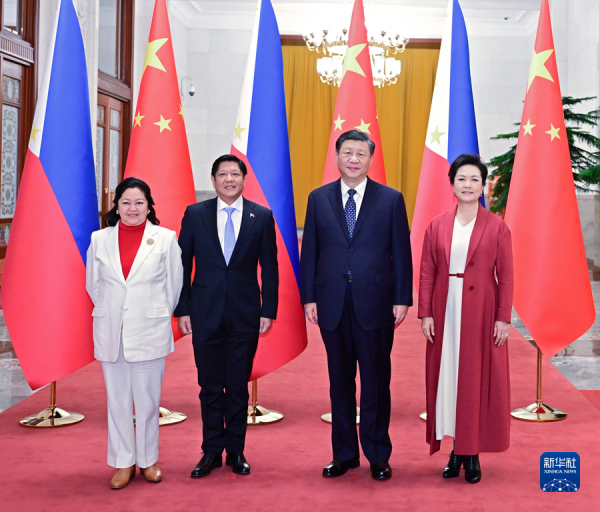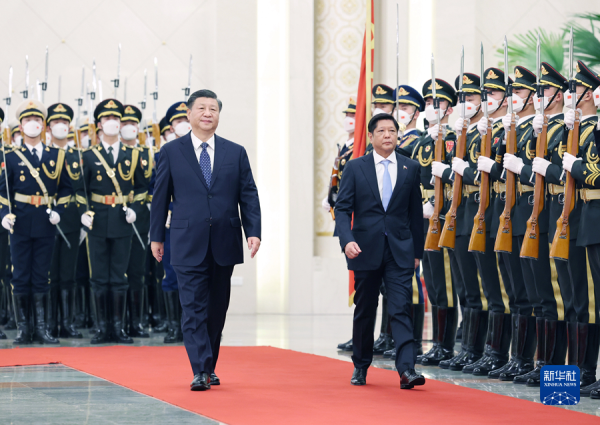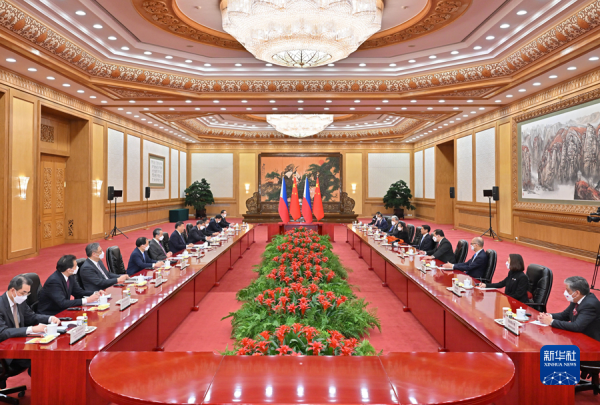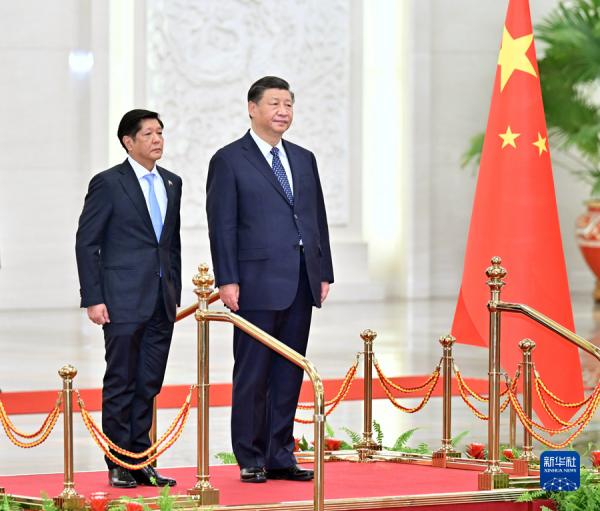
On the afternoon of 4 January, President Xi Jinping held talks with Philippine President Ferdinand Romualdez Marcos Jr. at the Great Hall of the People during the latter’s state visit to China.
President Xi welcomed President Marcos Jr. on his first visit to China as the Philippine President. President Xi noted that this is the first official visit of President Marcos Jr. to a country outside ASEAN, and that he is the first foreign leader China hosts in 2023. This speaks volumes about the close ties between China and the Philippines and the important place that the two countries take in each other’s foreign policies. China and the Philippines are close neighbors facing each other across the sea. In their exchanges over a millennium, good faith and mutual assistance have remained the defining feature of bilateral relations and a precious legacy cherished by the two peoples. Forty-eight years ago, the father of President Marcos Jr. and the Chinese leaders of the older generation keenly grasped the changing situation at that time. They followed the trend of the times and made the historic decision of establishing diplomatic ties between the two countries. Over the past half-century since then, despite changes in the international landscape and the domestic politics of the Philippines, President Marcos Jr. and his family have stayed committed as ever to promoting the China-Philippines friendship, a commitment that is most invaluable. President Xi expressed his hope that this visit will be a journey to retrace history and, more importantly, a journey to plan for the future. China views the Philippines as a priority in its neighborhood diplomacy and approaches its relations with the Philippines from a strategic and overall perspective. President Xi expressed readiness to stay in regular strategic communication with President Marcos Jr. and make comprehensive plans for the growth of bilateral ties so that the two countries will stay good neighbors helping each other, good relatives sharing affinity, and good partners pursuing win-win cooperation, delivering more benefits to the two peoples and contributing more positive energy to peace and stability in the region.

President Xi emphasized that despite different national conditions and systems, China and the Philippines have similar goals and paths of development and enjoy vast potential for cooperation. The two sides need to strengthen exchanges and mutual learning between government agencies, between legislatures, and between political parties to form greater synergy between their development strategies, seek more complementarity in each other’s modernization drive, and better serve development and prosperity in both countries. The two sides have identified agriculture, infrastructure, energy, and people-to-people exchanges as four priority areas of cooperation. They are the main pillars for the China-Philippines relationship of comprehensive strategic cooperation, and more efforts must be made to nurture new growth areas and highlights in these fields. As China is advancing rural revitalization across the board and moving faster to build the country’s strength in agriculture, it stands ready to help the Philippines in agricultural and rural development, by such means as turning the Philippine-Sino Center for Agricultural Technology into a signature project, carrying out cooperation on the whole industrial chain including breeding, production, processing and storage, and accelerating cooperation in Juncao technology. The two countries need to promote cooperation in infrastructure and connectivity, including good implementation of key cooperation projects in “hard” infrastructure and broader cooperation in “soft” infrastructure including telecommunication, big data and e-commerce, to boost the overall economic and social development of the Philippines. China and the Philippines have a lot to offer each other when it comes to cooperation on both fossil fuels and clean energy. China will work with the Philippines to continue to properly handle maritime issues through friendly consultation, resume negotiations on oil and gas exploration, promote cooperation on oil and gas exploration in non-disputed areas, and conduct green energy cooperation on photovoltaics, wind power, and new energy vehicles. China will continue to import more quality agricultural and fishery products from the Philippines and support Chinese business investments and cooperation in the Philippines. The two sides need to deepen people-to-people exchanges in all respects, expand cooperation on basic and vocational education, and explore innovation cooperation in such areas as meteorology and aerospace. China will continue to work with the Philippines on vaccine research and development, and foster a new mode of mutual assistance and cooperation between provinces, cities, districts and counties in light of local industrial strengths. China is taking proactive steps to adapt its COVID response and better coordinate it with economic and social development in a science-based manner. The people in China and the Philippines can soon resume close exchanges like before the pandemic.
President Xi stressed that China and the Philippines, two developing countries in Asia, have their development rooted in a friendly neighborhood and in the big family of Asia featuring win-win cooperation. China will work with the Philippines and other ASEAN countries to focus on cooperation and development, uphold ASEAN centrality in regional cooperation, and advance the five proposals on building a shared home together, to ensure the region stays away from the shadow of the Cold War and from bloc confrontation and remains a fine example of development and prosperity. China appreciates the Philippines’ support for the Global Development Initiative and the Global Security Initiative. China will work with the Philippines to render each other greater support, uphold the common interests of the two countries and other developing countries, advocate humanity’s common values, promote the building of a community with a shared future for mankind, and contribute to better regional and global governance.

President Marcos Jr. expressed his pleasure at making a visit that he has long looked forward to, which is also his first state visit to a country outside ASEAN. He expressed his hope to prove to the world through this visit that the Philippines-China relationship is in very good shape and is very important, and that both sides attach great importance to this relationship and are committed to taking it to a new height. Although it has only been 48 years since the Philippines and China established diplomatic relations, the friendship between the two peoples has lasted over a millennium. President Marcos Jr. underscored his privilege of being part of history in the establishment of the diplomatic ties, and noted the important responsibilities that he is taking on to carry forward the longstanding friendship between the two countries. He expressed his readiness for close communication with President Xi and closer cooperation on all fronts to open a new chapter in the Philippines-China relationship of comprehensive strategic cooperation, better resolve common challenges and issues facing the two countries, deliver more benefits to the two peoples, and make new contribution to reestablishing the region as a major engine of the world economy. The Philippines is ready to work with China to unlock potentials, further enrich the bilateral relationship, and deepen cooperation in agriculture, infrastructure, energy, people-to-people exchanges, trade, investment, science and technology, and digital economy, among others. The cooperation documents to be signed today in the presence of the two presidents will lend a strong impetus to economic development in the Philippines. China is the strongest partner of the Philippines, and nothing can hold back the continuation and development of the Philippines-China friendship. The Philippines adheres to the one-China policy. It is willing to continue to properly handle maritime issues through friendly consultation, and resume negotiations on oil and gas exploration. President Marcos Jr. thanked China for providing valuable support to his country’s fight against COVID-19. He expressed his hope that when the pandemic is over, more Chinese tourists and students will go to the Philippines and more people-to-people exchanges will take place to lay a more solid foundation for the long-term development of bilateral relations. He expressed full confidence in the outlook of the bilateral relations.
After the talks, the two presidents jointly witnessed the signing of cooperation documents on Belt and Road cooperation, agriculture, fishery, infrastructure, finance, customs, e-commerce and tourism.

Prior to the talks, President Xi held a welcoming ceremony for President Marcos Jr. at the Northern Hall of the Great Hall of the People.
A 21-gun salute was fired in Tiananmen Square. A guard of honor lined up in salutation and fanfare trumpets were played. The two presidents stepped onto a stand and a military band played the national anthems of China and the Philippines. President Marcos Jr. reviewed the guard of honor of the People’s Liberation Army and watched the march-past in the company of President Xi.

Madame Peng Liyuan, wife of President Xi, and Madame Louise Araneta-Marcos, wife of President Marcos Jr., also attended the welcoming ceremony.
On the evening of the same day, President Xi and Madame Peng hosted a welcoming banquet for President Marcos Jr. and his wife at the Golden Hall of the Great Hall of the People.
Wang Yi and He Lifeng were present at the events.
During President Marcos Jr.’s visit to China, the two sides will release a Joint Statement Between the People’s Republic of China and the Republic of the Philippines.

